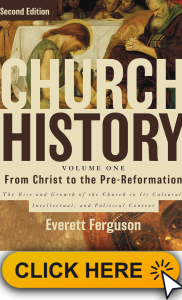HISTORY OF CONFESSION
How does the history of confession relate to periods of persecution and integrate into the early church’s thought about the doctrines of salvation and the church? That is, if a baptized believer succumbed to persecution and gave up his/her faith, did the church believe salvation was lost as a result? Also, could the church include Christians who denied their faith?

Church History, Volume One: From Christ to the Pre-Reformation: The Rise and Growth of the Church in Its Cultural, Intellectual, and Political Context
According to Ferguson, the reign of Roman Emperor Decius (249-251) increased the persecution of Christians significantly. The Emperor issued an empire wide edict requiring individuals to make sacrifices to pagan gods. Due to recent tranquility in the region, the commitment of many Christians had waned, accordingly, a significant number of believers lapsed by abiding by the Emperor’s decree or obtaining a certificate of compliance.[1] The persecution led to two church schisms. One schism, led by Felicissimus, championed the view of the confessors who permitted instantaneous reconciliation of the lapsi. The second schism was led by Novatian who denied any possibility of reconciliation for those who had lapsed.[2] Alternatively, a synod of bishops in 251 at Carthage approved the viewpoint of a relatively new convert and church leader, Bishop Cyprian of Carthage.[3] Cyprian confronted the laxism of Felicissimus and the rigorism of Novatian by advocating a mediating position that neither supported immediate restoration nor irreversible reconciliation.[4]
Cyprian’s solution was based on a view that the lapsed had denied Christ, thus, they caused Christ to deny them salvation, and he supported this claim by quoting God speaking in Exodus saying, “he that sacrifices unto any gods, save unto the Lord only, shall be destroyed.”[5] Cyprian furthers his opposition against the lapsi’s actions by rhetorically asking, “Did He not before ordain for those who deny Him eternal punishments,” and continues the indictment by saying to them, “you have immolated your salvation, your hope; there you have burnt up your faith in those deadly fires.”[6] Additionally, Cyprian provided anecdotal evidence in an attempt to prove the loss of salvation through various experiential references including a lapsed individual vomiting after taking communion to prove the Eucharist does not ameliorate the ignoble, instead, the denial caused the Lord to withdraw.[7] Broadening his application, Cyprian suggests those who attempted to obtain certificates will not elude the judgment of God either and neither will those who thought about the possibility of denial by rhetorically asking, “Does he think that he is a Christian, who is either ashamed or afraid to be a Christian?”[8] Finally, Cyprian relents by suggesting that proper prayer, true contrition, and persistent works of penance will once again bring salvation by referencing Isaiah’s claim that, “when you turn and lament, then shall you be saved.”[9]
Cyprian extended his salvific logic by practically applying it to a proposed method of reconciliation to the church. In summary, those who committed the sacrificial offense could only be placed back into communion at the time of death, those who procured certificates by methods other than sacrifice were required to be disciplined and also wait a period of time, and those who thought denial was a possibility were required to privately confess to the clergy.[10] Cyprian’s policy established a church discipline policy that, similar to his view of restoring salvation, required public confession, “performance of works of penance,” and the “laying on of the hands of the bishop and clergy” and, in effect, placed individuals and even martyrs under the jurisdiction of the bishop.[11]
[1]. Everett Ferguson, Church History: Volume One: From Christ to Pre-Reformation: The Rise and Growth of the Church in Its Cultural, Intellectual, and Political Context (Grand Rapids, MI: Zondervan, 2005), 161.
[2]. Ibid., 164.
[3]. Ibid.
[4]. Ibid., 165.
[5]. Cyprian Treatise III 7
[6]. Cyprian Treatise III 8
[7]. Ibid., 25-26.
[8]. Ibid., 28.
[9]. Ibid., 36.
[10]. Ferguson, Church History: Volume One: From Christ to Pre-Reformation: The Rise and Growth of the Church in Its Cultural, Intellectual, and Political Context, 165.
[11]. Ibid., 166.
BIBLIOGRAPHY
Ferguson, Everett. Church History: Volume One: From Christ to Pre-Reformation: The Rise and Growth of the Church in Its Cultural, Intellectual, and Political Context. Grand Rapids, MI: Zondervan, 2005.
Roberts, Alexander, and James Donaldson, eds. Ante-Nicene Fathers Volume 5: Hippolytus, Cyprian, Caius, Novatian, Appendix. Peabody, MA: Hendrickson, 1999.


